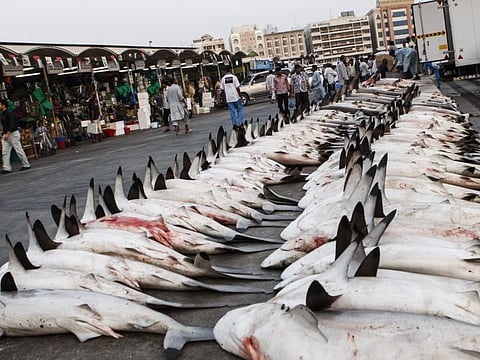Fishing ban: Sharks to go off the menu in UAE from next week
Ministry to impose annual ban on shark fishing and trade from March 1

Dubai: Sharks are likely to go temporarily off the menu in the UAE from next week as the annual ban on fishing and trade of sharks will come into effect from March 1.
The Ministry of Climate Change and Environment (MOCCAE) will impose the ban coinciding with the spawning season of the fish, the ministry announced on Wednesday.
The ban will continue until June 30 in line with the Ministerial Resolution No. 43 of 2019 regulating shark fishing and trade, the ministry said in a press release.
The resolution allows fishermen, who use permitted shark fishing gear and run registered lynch boats, to fish sharks from July 1 of each year until the last day of February of the following year.
The Resolution has permanently banned pleasure vessels from fishing sharks.
Halima Al Jasmi, head of the Fisheries Section at MOCCAE, said: “The seasonal ban on shark fishing and trade aligns with the Ministry’s strategic goal of preserving ecosystems and marine life, as it helps sustain the population of the species through giving them time to reproduce.”
The Ministerial Resolution No. 43 of 2019 is an effective tool for alleviating the pressure on sharks due to overfishing and habitat degradation.
Permanent ban on some species
In addition to the seasonal ban, it imposes a permanent ban on fishing shark and ray species listed in the Convention on International Trade in Endangered Species of Wild Fauna and Flora (CITES), the Convention on the Conservation of Migratory Species of Wild Animals (CMS), and the Federal Law No. 23 of 1999 concerning the exploitation, protection, and development of living aquatic resources in the UAE and its amendments.
It also permanently prohibits the import and re-export of shark fins — fresh, frozen, dried, salted, smoked, canned, or in any other form — excluding fins that are imported for scientific purposes, subject to approval of the Ministry.
MOCCAE said it has joined forces with federal and local stakeholders, including fishermen societies, to ensure compliance with fishing bans.
This is done through awareness campaigns and workshops aimed at helping fishermen understand how such measures protect and develop fisheries, and enhance their sustainability in the long term.
Sign up for the Daily Briefing
Get the latest news and updates straight to your inbox







